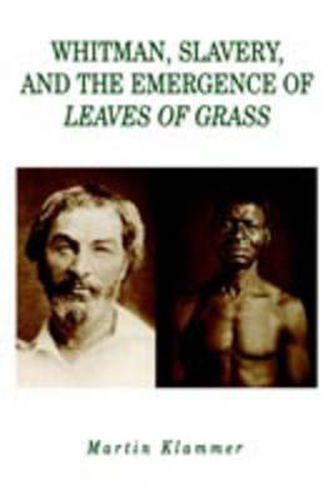Readings Newsletter
Become a Readings Member to make your shopping experience even easier.
Sign in or sign up for free!
You’re not far away from qualifying for FREE standard shipping within Australia
You’ve qualified for FREE standard shipping within Australia
The cart is loading…






Although the significance of Walt Whitman’s thinking about African Americans and slavery to his poetry has been largely ignored by Whitman scholars, Martin Klammer argues that Leaves of Grass is a major text dealing with race relations in the mid-nineteenth century. Through a close historical analysis, Klammer reveals how the evolution of Whitman’s attitudes–from pro-slavery to free soilism to a deep sympathy for slaves–parallels and inspires his emergence as a poet from the beginning of his career through the 1855 edition. The issue of slavery continually influenced Whitman’s work, culminating in 1854 when public reaction to two national developments on the slavery question–the passage of the Kansas-Nebraska Act and the case of the fugitive slave Anthony Burns–suddenly created an audience more receptive to Whitman’s views and compelled him to revise and publish the poems known as Leaves of Grass. At the heart of these poems is a radically new and sympathetic view of African Americans and of their significance to Whitman’s vision of a multiracial, egalitarian society.While previous critics have described Whitman’s puzzling, seemingly contradictory views on slavery, no other study has so thoroughly investigated Whitman and the question of slavery, nor understood the importance of slavery to Whitman’s development as a poet. Martin Klammer is Assistant Professor of English and Africana Studies at Luther College.
$9.00 standard shipping within Australia
FREE standard shipping within Australia for orders over $100.00
Express & International shipping calculated at checkout
Although the significance of Walt Whitman’s thinking about African Americans and slavery to his poetry has been largely ignored by Whitman scholars, Martin Klammer argues that Leaves of Grass is a major text dealing with race relations in the mid-nineteenth century. Through a close historical analysis, Klammer reveals how the evolution of Whitman’s attitudes–from pro-slavery to free soilism to a deep sympathy for slaves–parallels and inspires his emergence as a poet from the beginning of his career through the 1855 edition. The issue of slavery continually influenced Whitman’s work, culminating in 1854 when public reaction to two national developments on the slavery question–the passage of the Kansas-Nebraska Act and the case of the fugitive slave Anthony Burns–suddenly created an audience more receptive to Whitman’s views and compelled him to revise and publish the poems known as Leaves of Grass. At the heart of these poems is a radically new and sympathetic view of African Americans and of their significance to Whitman’s vision of a multiracial, egalitarian society.While previous critics have described Whitman’s puzzling, seemingly contradictory views on slavery, no other study has so thoroughly investigated Whitman and the question of slavery, nor understood the importance of slavery to Whitman’s development as a poet. Martin Klammer is Assistant Professor of English and Africana Studies at Luther College.